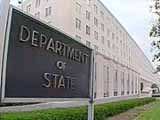|
|
TODAY.AZ / World news
U.S. State Department official: Door remains open and choice is Iran's to make
01 June 2011 [10:07] - TODAY.AZ
 Despite Tehran's unwillingness to reduce concerns about its nuclear activities, the United States and the international community as a whole continues to remain committed to diplomatic ways of resolving the crisis over Iran's nuclear program, U.S. Department of State official said.
Despite Tehran's unwillingness to reduce concerns about its nuclear activities, the United States and the international community as a whole continues to remain committed to diplomatic ways of resolving the crisis over Iran's nuclear program, U.S. Department of State official said."The U.S. and its P5+1 partners remain committed to pursuing a diplomatic solution, the U.S. Department of State official, who wished to remain unnamed, told Trend. The door remains open, and the choice is Iran’s to make."
Iranian nuclear program has caused concern since 2003, when the IAEA became aware of its concealed activity. In late 2003, Iran signed the Additional Protocol to the NPT and voluntarily announced about the suspension of uranium enrichment.
Enriched uranium can be used to produce nuclear weapons. However, it is necessary as fuel for nuclear power plants. Several states, including the U.S., believe Iran is seeking to develop nuclear weapons, and want to prevent this development. But Iran insists that as a party to the NPT it has the full right to use nuclear technology for peaceful purposes.
So far, the UN Security Council has adopted six resolutions to suspend the nuclear program of Iran, four of which involve economic and some political sanctions against Iran.
The official said the U.S. objective continues to be a comprehensive, long-term, negotiated solution, which restores international confidence in the exclusively peaceful nature of Iran’s nuclear program, while respecting Iran’s legitimate right to the peaceful use of nuclear energy.
"The U.S., along with a growing segment of the international community, has made it clear to Iran that there are consequences for its continued noncompliance of its NPT and IAEA obligations, as well as U.N. Security Council Resolutions," he said.
The official said Iran has failed to address the concerns of the international community about its illicit nuclear activities, instead using the most recent talks in Istanbul to deliver unacceptable pre-conditions.
"The threat this program poses is one of our greatest global concerns," he said.
The last round of negotiations on Iran's nuclear program took place in January 2011 in Istanbul. According to the EU High Representative for Foreign Affairs and Security Policy Catherine Ashton, who represented at the talks the "six" (five permanent Security Council members - Britain, China, Russia, USA, France plus Germany), the talks ended without result.
Ashton said that Iranian officials made "unrealistic" demands in the negotiations - lifting of UN sanctions against the Islamic Republic and the agreement under which Iran would continue its research in the field of nuclear energy.
The official said Iran’s intransigence has left the international community no choice but to employ a second tool of diplomacy: pressure.
"We have made clear to Iran’s leaders how much they have to gain from real engagement with the international community, and how much more they stand to lose from continuing down their current path," he said.
The aim of UNSCR 1929 and the other UNSCRs on Iran is to encourage Iran to engage constructively with the international community in pursuit of such a resolution, he said.
"We expect Iran to meet its international obligations regarding its nuclear program and return to negotiations, play a constructive role in its neighborhood, and respect the fundamental rights of its people and of American citizens currently in detention without charge, he said. Toward this end, we are committed to our dual-track strategy of engagement and pressure."
The official said the engagement is both a test of Iranian intentions, and an investment in a partnership with a growing coalition of countries deeply concerned about Iran’s nuclear ambitions.
/Trend/
URL: http://www.today.az/news/regions/87257.html
 Print version
Print version
Views: 1708
Connect with us. Get latest news and updates.
See Also
- 14 February 2026 [23:30]
LA 2028 Olympics chief to sell agency over Epstein uproar: reports - 14 February 2026 [22:55]
Ukraine, ASEAN discuss advancing mutually beneficial cooperation, deepening dialogue - 14 February 2026 [22:25]
Kazakhstan hosts Dala.Camp forum 2026 - 14 February 2026 [21:50]
Three killed in post-election clashes in Bangladesh as BNP secures parliamentary majority - 14 February 2026 [21:20]
Trump says regime change in Iran 'would be the best thing that could happen' - 14 February 2026 [20:15]
N.K. leader again inspects construction of memorial for troops deployed for Russia's war against Ukraine - 14 February 2026 [19:10]
Von der Leyen calls for new European security strategy at Munich Conference - 14 February 2026 [18:35]
China to scrap tariffs for most of Africa from May: Xi - 14 February 2026 [18:05]
Rubio: UN has potential but fails on today’s biggest crises - 14 February 2026 [12:40]
Passenger plane slides off runway at Kazan airport
Most Popular
 SOCAR discusses joint energy projects with US companies and Israeli cooperation
SOCAR discusses joint energy projects with US companies and Israeli cooperation
 Russia to begin talks with Armenia on restoring railway links connecting Azerbaijan, Türkiye and Iran
Russia to begin talks with Armenia on restoring railway links connecting Azerbaijan, Türkiye and Iran
 President Ilham Aliyev gives interview to France 24 in Munich [PHOTOS/VIDEO]
President Ilham Aliyev gives interview to France 24 in Munich [PHOTOS/VIDEO]
 Iranian foreign minister removed from UN Human Rights Council speakers list
Iranian foreign minister removed from UN Human Rights Council speakers list
 Nurda?–Kahramanmara? high-speed rail link to boost regional trade
Nurda?–Kahramanmara? high-speed rail link to boost regional trade
 Georgia to restrict older car imports
Georgia to restrict older car imports
 Kahramanmara? rebuilds after earthquake of century
Kahramanmara? rebuilds after earthquake of century
